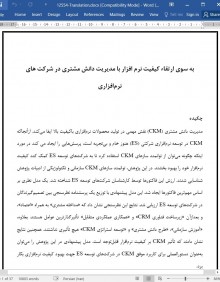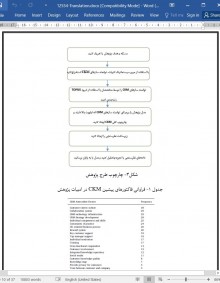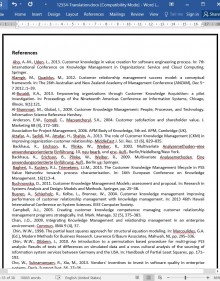
دانلود مقاله به سوی ارتقا کیفیت نرم افزار با مدیریت دانش مشتری در شرکت های نرم افزاری
چکیده
مدیریت دانش مشتری (CKM) نقش مهمی در تولید محصولات نرمافزاری باکیفیت بالا ایفا میکند. ازآنجاکه CKM در توسعه نرمافزاری شرکتی (ES) هنوز خام و بیتجربه است، پرسشهایی را ایجاد می کند در مورد اینکه چگونه میتوان از توانمند سازهای CKM استفاده کرد تا به شرکتهای توسعه ES کمک کند کیفیت نرمافزار خود را بهبود بخشند. در این پژوهش، توانمند سازهای CKM سازمانی و تکنولوژیکی از ادبیات پژوهش شناسایی شدند. ارزش این فاکتورها توسط کارشناسان شرکتهای توسعه ES شناخته شد. یک مدل نظری بر اساس مهمترین فاکتورها ایجاد شد. این مدل پیشنهادی با توزیع یک پرسشنامه نظرسنجی بین تصمیمگیرندگان در شرکتهای توسعه ES ارزیابی شد. نتایج این نظرسنجی نشان داد که «مداخله مشتری» به همراه «اعتماد»، و بعدازآن «زیرساخت فناوری CRM» و «همکاری عملکردی متقابل» تأثیرگذارترین عوامل هستند. بعلاوه، «آموزش سازمانی»، «طرح دانش مشتری» و «توسعه استراتژی CKM» هیچ تأثیری نداشتند. همچنین نتایج نشان دادند که تأثیر CKM بر کیفیت نرمافزار قابلتوجه است. مدل پیشنهادی در این پژوهش را میتوان بهعنوان دستورالعملی برای کاربرد موفق CKM در شرکتهای توسعه ES جهت بهبود کیفیت نرمافزاری بکار برد.
مقدمه
دانش مشتری (CK) برای رقابت شرکتها اهمیت روزافزونی دارد، پژوهش درزمینه مدیریت دانش (CKM) بهسرعت در حال افزایش است. CKM به شرکتها کمک میکند تا از اهرم دانش مشتری منحصربهفرد خود برای بهبود عملکرد محصول جدید، ارتقاء کیفیت محصول/خدمات، و قطع هزینهها استفاده کنند. بااینحال، شرکتهایی که مایلاند یک CKM با عملکرد خوب ایجاد کنند با چالش روبرو میشوند. بخصوص درباره اینکه مؤسسات چگونه باید شرایط انسانی، سازمانی و فنی را برای مدیریت CK بکار بگیرند و نسبت به نیازهای مشتری بیشتر جوابگو باشند، تحقیقاتی نشده است.
بیشتر مطالعات اخیر درزمینه ارتقاء کیفیت نرمافزار تنها بر ابعاد فن کیفیت نرمافزار همچون قابلیت اعتماد، قابلیت نگهداری، و عاملیت متمرکزشدهاند. بااینحال، به دلیل ماهیت نرمافزار شرکتی (ES)، انتقال و یکپارچهسازی CK برای سفارشیسازی، ارتقاء، تعمیر و نگهداری و آموزش لازم است.
7- نتیجهگیری
برای روشن ساختن موضوع،مدلی ایجاد شد که چارچوب کلی CKM را ترسیم میکند تا رابطه بین توانمند سازهای CKMو CKM همچنین رابطه بین CKM و کیفیت نرمافزار را نشان دهد.در این پژوهش، مدل پیشنهادشده در زمینه شرکتهای توسعه ES تأیید شد. از 12 فرضیه، 3 فرضیه (توسعه راهکار CKM، آموزش سازمانی و طرح دانش) رد شدند. نتایج ثابت کردند که توانمند سازهای CKM به سه دسته عوامل انسانی، سازمانی و تکنولوژیکی تقسیم شدند که تأثیر اثربخشی بر CKM دارند. رابطه بین CKM (بعد فرآیندها) و کیفیت نرمافزار (بعد دستاوردها) اهمیت آماری دارد. بنابراین، نتایج پژوهش شدیداً چارچوب کلی CKM را تأیید و از آن حمایت کرد.
KBV به ما این امکان را میدهد که انتظار داشته باشیم که استفاده از قابلیتهای انسانی، سازمانی و تکنولوژیکی فرآیندهای KM را بهبود میبخشد و اثربخشی محصول و خدمات را افزایش میدهد. بر طبق KBV، هنگامیکه محصولات و خدمات از منابع قابللمس ایجاد میشوند، ترکیب و کاربرد این منابع نقش مهمی ایفا میکند، که با عملکرد فوتوفن یک شرکت مرتبط است. ازاینرو، عوامل انسانی همچون شایستگیها و مهارتها، اعتماد بین مشتری و شرکت و عوامل سازمانی همچون فرهنگسازمانی، همکاری عملکردی متقابل، مداخله مشتری، حمایت مدیریت ارشد و همچنین عوامل فنّاورانه همچون زیرساخت CRM و نظام همکاری و تعاون CKM را در سازمانهای نرمافزاری فراهم و بر آن تأثیر میگذارند.
در پژوهش حاضر، 8 توانمند ساز CKM بهطور آماری اثبات کردند که میتوانند CKM را ارتقاء بخشند و CKM بهطور قابلتوجهی منجر به یکی از بروندادهای مهم برای شرکتهای توسعه نرمافزار میشود. این دستور با نظریه KBV همخوانی دارد، که توضیح میدهد دانش منبعی متمایز است و اینکه عملکرد یک سازمان (ازلحاظ کسبوکار، نوآوری، عملیات، کیفیت محصولات و خدمات) وابسته به این است که چطور اعضای یکنهاد کسبوکار میتوانند بهدرستی مبنای دانش خود را بهبود بخشند، دانش و اطلاعات جدید را در درون نهاد کسبوکار و همچنین منابع خارجی برای نهاد کسبوکار همسانسازی کنند، و از دانش برای تنظیم محصولاتی باکیفیت و تازگی عالی استفاده کنند.
Abstract
Customer Knowledge Management (CKM) plays an important role in the production of high quality software products. As CKM in Enterprise Software (ES) development is still immature, this raises questions on how CKM enablers can be used to help ES development companies improve their software quality. In this study, Human, Organizational and Technological CKM enablers were identified from the literature. The weights of these factors were determined by experts from the ES development companies. Based on the most important factors, a theoretical model was developed. The proposed model was evaluated by distributing a survey questionnaire to decision-makers in ES development companies. The results showed that “Customer Involvement” together with “Trust” were the most influential factors, followed by “CRM Technology Infrastructure” and “Cross-Functional Cooperation”. In addition, there was no impact from “Organizational Training”, “Customer Knowledge Map”, and “CKM Strategy Development”. The results also revealed that the impact of CKM on software quality is significant. The proposed model in this study can be used as a guideline for the successful application of CKM in ES development companies to improve the software quality.
1. Introduction
Customer Knowledge (CK) is increasingly important for company competitiveness. Consequently, research on Customer Knowledge Management (CKM) is rapidly increasing (Korhonen-Sande and Sande, 2016; Wang, 2015; Rollins et al., 2012). CKM helps companies leverage their unique CK to improve the new product performance, enhance product⧹service quality, and cut costs (Korhonen-Sande and Sande, 2016; Salojärvi et al., 2013; Rollins et al., 2012). However, companies desiring to develop a wellfunctioning CKM face challenges (Korhonen-Sande and Sande, 2016; Wang, 2015; Rollins et al., 2012). In particular, there is a lack of research on how firms should deploy Human, Organizational and Technological conditions to manage CK and become more responsive to customer needs (Korhonen-Sande and Sande, 2016; Salojärvi et al., 2013; Garrido-Moreno and Padilla-Meléndez, 2011).
Many previous studies in software quality enhancement have only focused on the technical aspects of software quality such as reliability, maintainability, and functionality. However, because of the nature of Enterprise Software (ES), the transfer and integration of CK for customization, enhancements, maintenance and training is required (Schaarschmidt et al., 2015; Cho et al., 2013).
7. Conclusion
To shed light on the topic, a model was developed that draws on the Generic CKM Framework to indicate links between the CKM enablers and the CKM as well as the CKM and the software quality. In this research, the proposed model was confirmed in the context of the ES development companies. Of 12 hypothesizes, 3 of them (CKM Strategy Development, Organizational Training and Knowledge Map) were rejected. The results confirmed that the CKM enablers are categorized into the Organizational, Human and Technological factors that have an effective impact on the CKM. The relationship between the CKM (Processes dimension) and software quality (Outcomes dimension) is statistically significant. Thus, the results of this study strongly confirmed and supported the Generic CKM Framework.
The KBV enabled us to expect that the use of Human, Organizational and Technological capabilities improves the KM processes and increases the product and service effectiveness. According to KBV, when developing products and services from tangible resources, the combination and application of those resources plays a vital role, which is related to the function of an enterprise’s know-how. Therefore, the Human factors such as Competencies and Skills, Trust between the Customer and Company and Organizational factors such as Organizational Culture, Cross-Functional Cooperation, Customer Involvement, Top Management Support as well as Technological factors such as CRM Infrastructure and Collaboration System enable and influence the CKM in the software organizations.
In this study, 8 CKM enablers were statistically approved that can enhance the CKM and the CKM significantly lead to one of the vital outputs for the software development companies. This outcome is consistent with the KBV theory, which elucidates that knowledge is a distinctive resource and that the performance of an organization (in terms of business, innovation, operations, product & service quality) is dependent on how soundly members of a business entity can improve their knowledge base, assimilate new knowledge and information within the business entity as well as the external sources to the business entity, and apply the knowledge to the formulation of products with excellent quality and novelty.
H1. Individual competences and skills positively influence the CKM in the ES development context.
H2. Trust between customer and company positively influences the CKM in the ES development context.
H3. Customer involvement positively influences the CKM in the ES development context.
H4. Customer-Centric Culture positively influences CKM in ES development context.
H5. CKM strategy development positively influences the CKM in the ES development context.
H6. Top management involvement positively influences the CKM in the ES development context.
H7. Training program positively influences CKM in ES development context.
H8. Cross-functional cooperation positively influences the CKM in the ES development context.
H9. CRM technology positively related to the CKM in the ES development context.
H10. Collaboration system positively related to the CKM in the ES development context.
H11. Knowledge map positively influences the CKM in the ES development context.
H12. CKM positively influences the Software Quality in the ES development context.
H1- شایستگیها و مهارتهای فردی بر CKM در زمینه توسعه ES تأثیر مثبتی میگذارد.
H2- اعتماد بین مشتری و شرکت بر CKM در زمینه توسعه ES تأثیر مثبت میگذارد.
H3- مداخله مشتری تأثیر مثبتی بر CKM در زمینه توسعه ES دارد.
H4- فرهنگ مشتری محور در زمینه توسعه ES تأثیر مثبتی بر CKM میگذارد.
H5- توسعه راهکار CKMدر زمینه توسعه ES تأثیر مثبتی بر CKM میگذارد.
H6- دخالت مدیریت ارشد در زمینه توسعه ESبر CKMتأثیر مثبتی میگذارد.
H7- برنامه آموزشی در زمینه توسعه ES بر CKM تأثیر مثبت میگذارد.
H8-همکاری عملکردی متقابل در زمینه توسعه ES تأثیر مثبتی بر CKM میگذارد.
H9- فناوری CRM در زمینه توسعه ES تأثیر مثبتی بر CKM میگذارد.
H10- نظام همکاری و تعاون در زمینه توسعه ES تأثیر مثبتی بر CKM میگذارد.
H 11- طرح دانش در زمینه توسعه ES تأثیر مثبتی بر CKM میگذارد.
H 12- CKM در زمینه توسعه ES تأثیر مثبتی بر کیفیت نرمافزار میگذارد.
چکیده
مقدمه
2- مرور ادبیات پژوهش
1-2 مدیریت دانش مشتری
2-2 چارچوب کلی CKM
1-2-2 توانمند سازهای CKM
2-2-2 فرآیندهای CKM
3-2-2 دستاوردهای CKM
4-2-2 کیفیت نرمافزار
3- روش پژوهش
4- تنظیم فرضیههای پژوهش
1-4 شایستگیها و مهارتهای فردی
2-4 اعتماد بین مشتری و شرکت
3-4 مداخله مشتری
4-4 فرهنگ مشتری محور
5-4 توسعه راهکار CKM
6-4 حمایت مدیریت ارشد
7 -4آموزش سازمانی
8-4 همکاری عملکردی متقابل
9-4 زیرساخت فناوری CRM
10-4 نظام تعاون و همکاری
11-4 طرح دانش
12-4 CKM و کیفیت نرمافزار
5- تحلیل دادهها و بحث و گفتگو
1-5 پروفایل پاسخگویان در نظرسنجی
2-5 ارزیابی مدل اندازهگیری
3-5 ارزیابی مدل ساختاری
4-5 بحث و گفتگو
6- مفاهیم و محدودیتها
1-6 مفاهیم نظری
2-6 مفاهیم عملی
3-6 پیشنهادهایی برای مطالعات بعدی
7- نتیجهگیری
منابع
ABSTRACT
1. Introduction
2. Literature review
2.1. Customer Knowledge Management
2.2. The Generic CKM framework
2.2.1. CKM Enablers
2.2.2. CKM Processes
2.2.3. CKM Outcomes
2.2.4. Software Quality
3. Research methodology
4. Hypothesis formulation
4.1. Individual Competences and Skills
4.2. Trust between Customer and Company
4.3. Customer involvement
4.4. Customer-Centric culture
4.5. CKM Strategy Development
4.6. Top management support
4.7. Organizational training
4.8. Cross-Functional cooperation
4.9. CRM Technology infrastructure
4.10. Collaboration system
4.11. Knowledge map
4.12. CKM and Software quality
5. Data analysis and discussion
5.1. Profile of respondents
5.2. Assessment of measurement model
5.3. Assessment of the structural model
5.4. Discussion
6. Implications and limitations
6.1. Theoretical implications
6.2. Practical implications
6.3. Suggestions for future studies
7. Conclusion
References
- اصل مقاله انگلیسی با فرمت ورد (word) با قابلیت ویرایش
- ترجمه فارسی مقاله با فرمت ورد (word) با قابلیت ویرایش، بدون آرم سایت ای ترجمه
- ترجمه فارسی مقاله با فرمت pdf، بدون آرم سایت ای ترجمه



